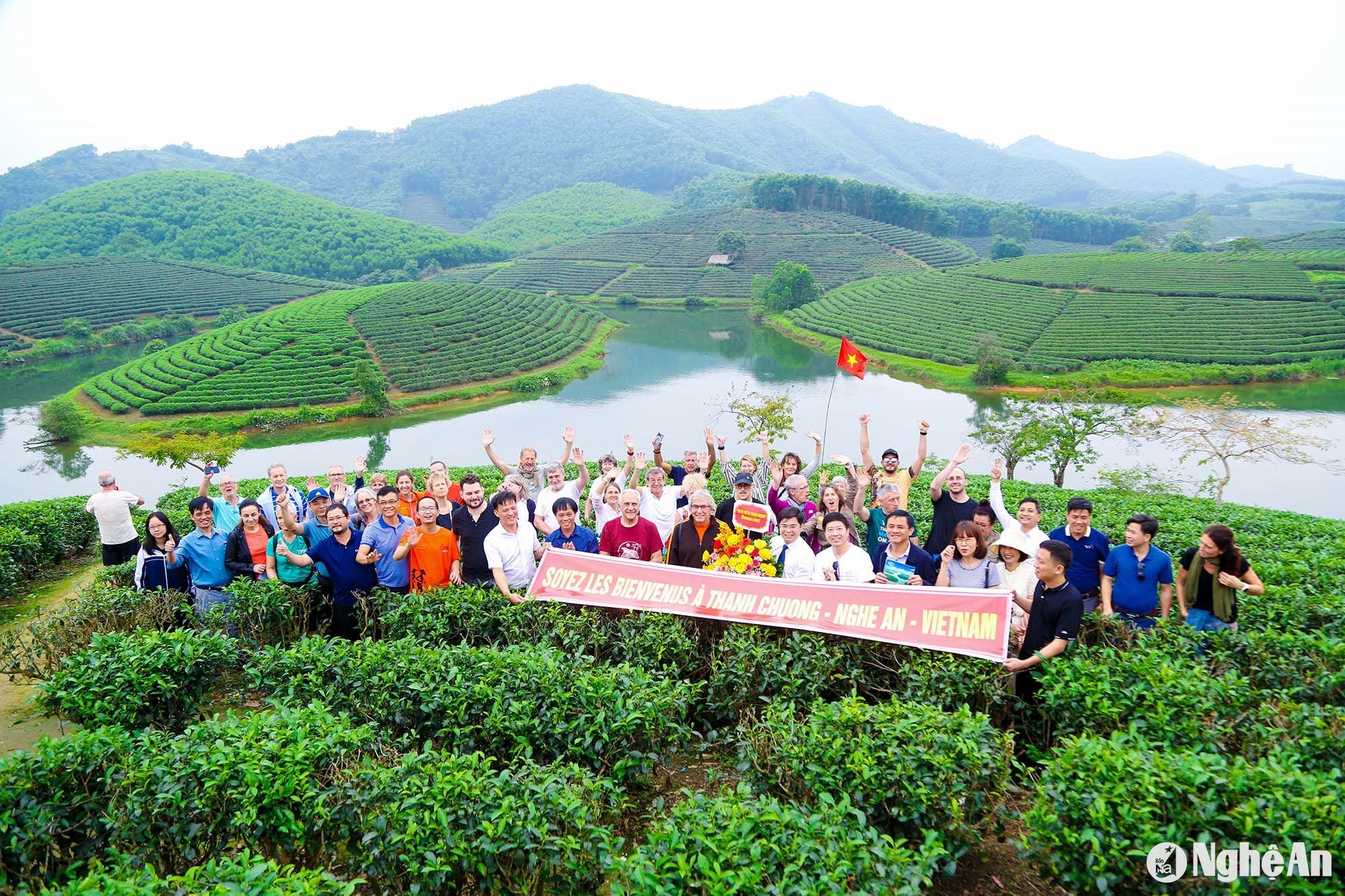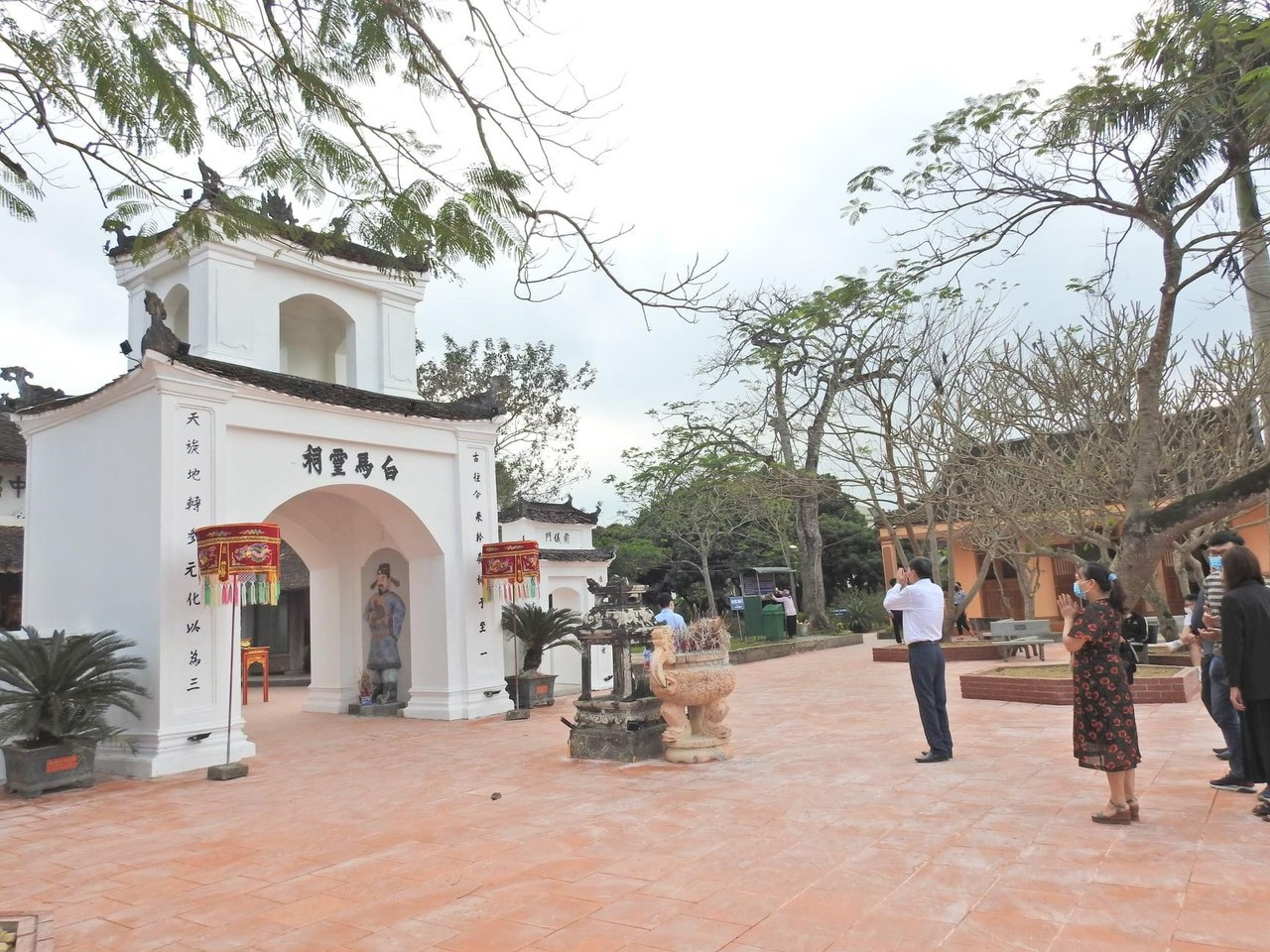Some thoughts on the character of Thanh Chuong
In this era of deep integration, alongside mechanical movement, interaction, connection, and business dealings with numerous partners are becoming increasingly rich and diverse across many spaces. In Thanh Chuong, the people are proud to preserve their traditional identities while continuously interacting and learning to become "global citizens."

When it comes to the character and qualities of the people of Nghe An, many will surely agree with Professor Vu Ngoc Khanh: Every person from Nghe An possesses four characteristics: ideals in their soul; unwavering loyalty in their nature; austerity in their lifestyle; and resilience in their interactions.
As a district with a large area of over 1,100 km2 and a large population of over 250,000 people, Thanh Chuong's land and people possess many distinctive characteristics that are characteristic of the "Nghe An brand".

I'm not a researcher. But having been born and raised in the community, through books and stories, I've seen many characters and stories in my hometown that strongly reflect these traits. Just looking at a few fairly typical stories, we'll see:
Dr. Nguyen The Binh was born in the "Trai Cat Ngan" region and possessed exceptional intelligence. He earned his doctorate in 1768, his name was inscribed on the stele at the Temple of Literature, and the king granted him land in his hometown to harvest. Out of compassion for the suffering people, he did not keep the fertile land for himself but chose Trieu Son – a hilly area full of rocks and a narrow plain – as his land of reward.

Historical records state: In those turbulent times, the country was in turmoil. Consort Dang Thi Hue, favored by Lord Trinh, engaged in immoral behavior within the Lord's court, arousing resentment in many, yet no one dared to remonstrate. Furthermore, Dang Mau Lan, Hue's younger brother, disregarded morality, indulging in excessive debauchery, depravity, and contempt for others. The situation became unacceptable, and Mau Lan had to be brought to trial. Everyone hated Mau Lan, but when it came time to judge, it was like "hanging a bell around a cat's neck." Some feigned illness, others cleverly excused themselves. In truth, they feared that a lenient sentence would be unlawful, while a fair punishment would risk retaliation from Thi Hue and Mau Lan. They feared harm to themselves. Scholar Cat Ngan was appointed to preside over the trial. Nguyen The Binh was meticulous, honest, and straightforward. Mau Lan received a very harsh sentence. The courtiers were delighted but also filled with awe and admiration.
Scholar Dinh Nhat Than, from Tien Hoi village (now Thanh Tien commune), is mentioned in the "Records of National Examination Success": "He memorized everything after reading a book once. When writing, he finished immediately without needing a draft; his ideas were novel and mostly deviated from the conventional literary styles of the time. Once he finished a poem, he discarded it, leaving no trace" (Cao Xuan Duc, "Records of National Examination Success", Literature Publishing House, page 69).

He earned his doctorate in the same year as Cao Bá Quát and his name is inscribed on the stele at the Temple of Literature. Scholar Đinh was a free-spirited and unrestrained man, skilled in literature and poetry, and a renowned physician, famous for his unique prescriptions.
The story goes: The mother of a high-ranking official fell seriously ill, and despite numerous treatments, she did not recover. The official summoned a scholar to examine her. Upon hearing the summons, the scholar replied: "In the past, people only invited doctors to treat illnesses, not forced the doctor to treat them!" The official was very angry, but for the sake of his mother's life, he had to condescend and invite Scholar Dinh. According to custom, for people of high status, one would only ask questions and tie a thread around the wrist for the doctor to take the pulse. The scholar refused, insisting on taking the pulse himself, examining the face, and the tongue. The official had no choice but to comply. After the examination, the scholar prescribed a single-ingredient medicine, and after only one dose, the mother recovered.
Đinh Nhật Thận was a close friend of Cao Bá Quát and Nguyễn Hàm Ninh, both renowned for their intelligence at the time. Historical records recount many stories about his talent and the jealousy and controversies surrounding him. Because of his admiration for his abilities, Emperor Tự Đức kept him in the capital to teach the royal family's children, also as a way to keep him under control. He died in the year Bính Dần (1866).

In the early 19th century, in Vo Liet, there was Dr. Phan Si Thuc, a man of talent, virtue, and integrity. Even after retirement, he remained in office and passed away at the courthouse at the age of 69. While serving as an official, he always remembered his father's advice: "You must earn the people's trust and affection, not fear or resentment." "Si Thuc served as an official for over 40 years while living a simple, honest life in a thatched house with mud walls..." The house where he is currently worshipped was voluntarily built by his students after his death.
Nguyen Si Sach, from Tu Vien village, Thanh Luong commune, graduated at the top of his class in Nghe An province. He was a close friend of Dang Thai Mai and Ton Quang Phiệt. He joined the revolutionary movement early on, becoming Secretary of the Central Vietnam Regional Committee at the young age of 26. In 1929, he was arrested by secret police and transferred through several prisons. Wherever he went, he was the driving force behind the "transforming prisons into schools" movement, fighting against the harsh regime of the imperialists and colonialists. The French chief of secret police, Cong Bo, in charge of the prison, knowing his importance, resorted to all sorts of cunning tactics. When sweet talk and bribery failed, they subjected him to brutal interrogation.
Unable to subdue the young communist, they took him to his solitary confinement cell. Nguyen Si Sach carried a mat ahead, while Cong Bo followed behind, angrily cursing in French. He directly insulted them in French, calling them barbaric invaders who boasted about civilization, and simultaneously struck Cong Bo in the face with the mat. To protect the bloodthirsty prison warden from being struck in the face with the mat, the henchmen shot and killed Nguyen Si Sach.

From the 1930s, Vo Quy Huan, originally from Thanh Tung, graduated with three prestigious university degrees in France. He had his own family in France, a wife of French-Russian descent, and a daughter. In 1946, while his wife was working on her doctoral dissertation, he set aside his personal happiness and followed President Ho Chi Minh back to Vietnam to fight in the resistance – he is considered the "father of Vietnam's casting and metallurgy industry," and together with Professor Tran Dai Nghia, he manufactured weapons for the Vietnamese army to fight the French. Professor Nghia called him "the engineer deeply devoted to his country."
Nguyen Bui Voi, from Tho Son - Cat Ngan village, at the age of 17, joined Xuan Dieu in reciting poetry to promote land reform. He studied at a school campus in China. In 1957, he returned to work as a subject group leader and taught Literature at the Hanoi Teacher Training College. One time, the Director of the Department of Teacher Education observed a teacher in the group. In contrast to the group leader and other teachers, the Director completely rejected both the content and the teaching methods. Everyone was afraid and timid, not daring to say anything. Nguyen Bui Voi disagreed. He politely asked: "In terms of age, we are your juniors; in terms of position, we are your subordinates; academically, you are a Doctor, but in terms of science, please allow us equality, exchange ideas, and debate…"
The Head of Department, annoyed, grabbed his briefcase and left immediately to report to the Minister. A few days later, without any prior notice, Professor and Minister Nguyen Van Huyen personally came to the school to attend a Literature lesson taught by the "young scholar from Nghe An." Immediately after the bell rang signaling the end of class, the Minister stepped onto the podium, moved, embraced him, praised him, and expressed his hope that all Literature teachers in Vietnam could teach like him! Nguyen Bui Voi was overjoyed and shed tears.
Living a simple, frugal life, being strict with members of the royal family, refusing to bow down to arrogance and tyranny, and bravely accepting death before the enemy—in every era, people often suffer losses. But not everyone can do that. Many respect, admire, and are proud of such individuals and their actions, but some believe they are too extreme, lacking in flexibility, and wonder why they didn't choose a gentler, more beneficial approach. That's a matter of personal opinion!
The above anecdotes are just typical stories, passed down through history and generations. Throughout history, this land has witnessed countless similar events. I keep wondering: Is it because they were born and raised on this barren land, having to contend with harsh natural disasters and wars, that only this particular "quality" has allowed them to survive and thrive?

Typically, personality traits create pairs of "light and dark" categories, opposing each other: Being too straightforward can be rigid; being too confident can be conservative; being too decisive can be extreme; being too frugal can lead to asceticism and stinginess; being too generous can lead to conservatism and stubbornness; being too united can easily lead to factionalism, narrow-mindedness, and parochialism… in short, anything taken to extremes is not good or beneficial!
Our country and homeland are continuously integrating with all parts of the country and the international community. Besides the already strong movement of people, the exchange, connection, and business with many partners in a wide-open space are becoming increasingly rich and diverse. Respecting, being proud of, and preserving traditional identities is very valuable. At the same time, constantly exchanging, learning, and adapting to become "global citizens" is a crucial requirement in the current period.



